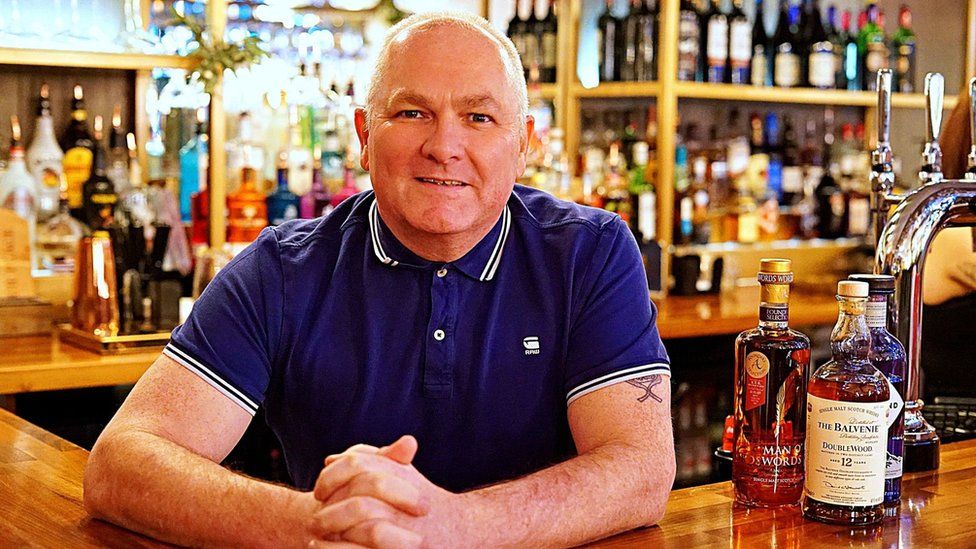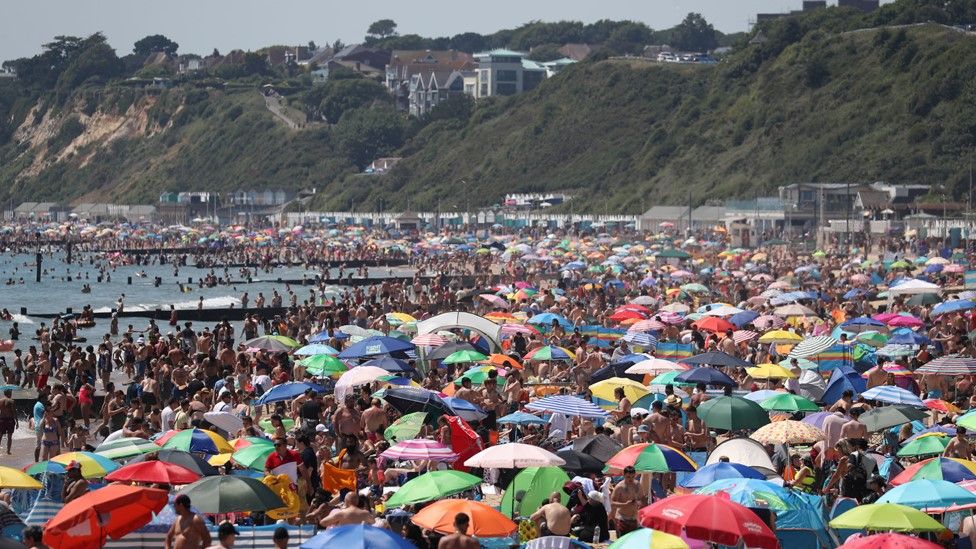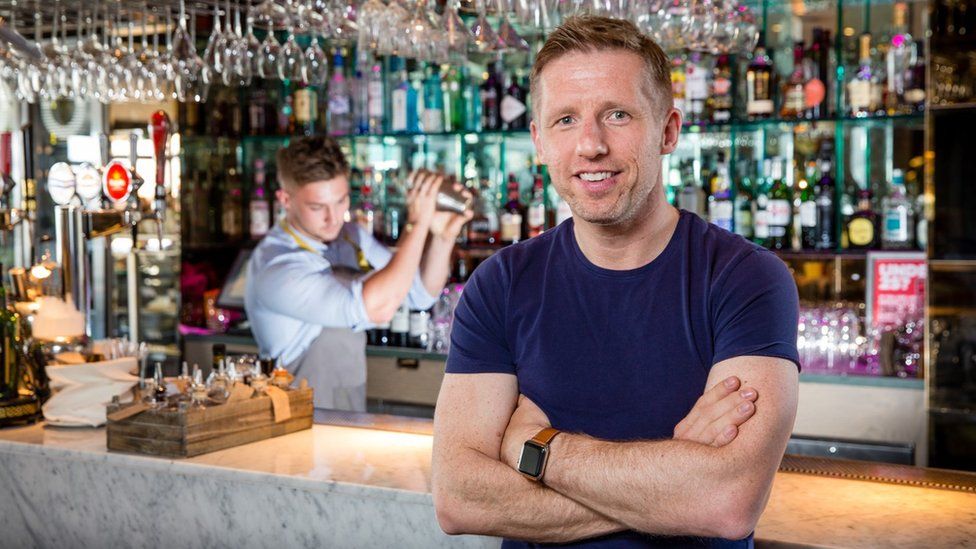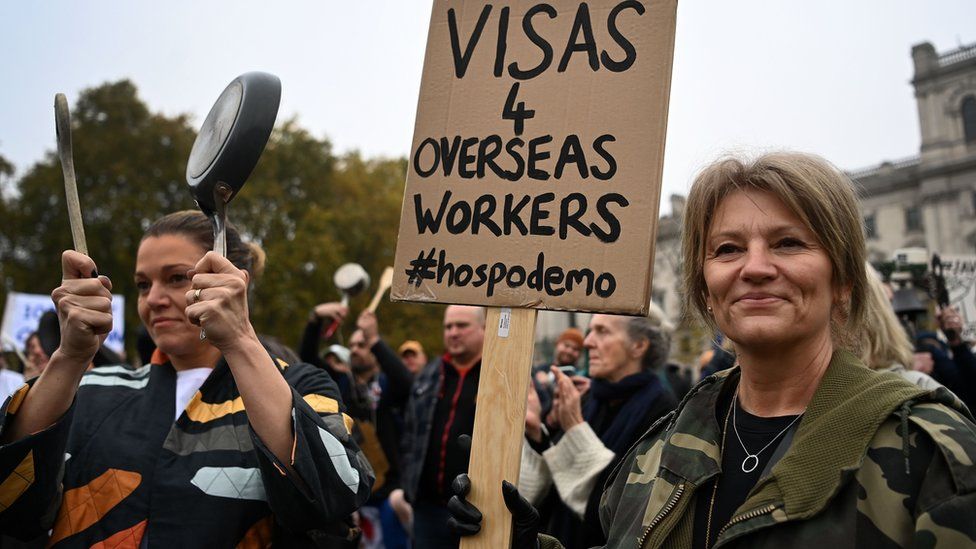
The UK’s hospitality sector is still short-staffed and businesses fear they will struggle to cope over the busy summer holiday season.
It comes as former government minister George Eustice called for EU workers to be allowed into the UK to ease post-Brexit shortages.
Trade body UK Hospitality also said staffing was in “serious crisis” – with vacancies 48% higher than pre-Covid.
The government said staff could be hired under its points-based system.
- Hotels and bars need more EU workers, say bosses
Restaurateur Stephen Montgomery told the BBC he was “anxious to a degree” about the summer. He runs Our Place in Annan, near Lockerbie – he is also chair of the Scottish Hospitality Group.
“Just as we were trying to take the business from five to seven days a week, bang we lost two members of staff, both front of house,” he said.
But it means he may have to cut down his opening hours. “If I have to close to make sure my staff aren’t burned out, I will. Why risk losing more staff for financial gain?”
However, he is hopeful of recruiting soon – his business is offering interest-free loans and cost of living grants to employees as incentives in a tight labour market.
Now, Mr Montgomery’s plight, along with others, has been highlighted by the former environment secretary and outgoing MP Mr Eustice who has picked up the post-Brexit staffing baton. Speaking in the Observer, Mr Eustice called for a reciprocal visa scheme for under-35s to work across the EU and Britain.
“I am very sceptical about a skills-based immigration policy because we have no shortages in those areas, but where we do have shortages is in hospitality, it’s quite acute there. We could have a two-year youth mobility scheme which would have no permanent impact on immigration numbers,” he told the BBC.

An industry outlook by Deloitte for 2023 said disruptions due to staff shortages, underpinned by high inflation, would likely increase and last beyond 2025.
The accounting firm also forecast a lack of economic growth and rising costs, with an inability to raise prices as the key risks in the sector.
Staffing is a problem for the Lamplighter Dining Rooms in Windermere, in the heart of the Lake District.
Open 365 days of the year it can seat 100 guests but owner James Tasker said filling the rota had been “more of a challenge” since the pandemic.
“The southern European contingent just didn’t come back,” he said. “Then there’s the surging cost of living, coupled with unaffordable rental accommodation, that’s in phenomenally short supply here.
“We may face certain days where we have to restrict the volume of guests, which is disappointing but it’s not all about the money.”
Having fewer guests was preferable to giving customers bad service and getting negative reviews. “We’re conscious of our reputation,” Mr Tasker added.
Vacancies
The background to these challenges are post-Brexit working regulations and Covid, both of which have severely affected the sector. The Office for National Statistics (ONS) said the level of vacancies was still 48% higher than pre-Covid levels.
An ONS update is due on Tuesday but it said available roles fell by 22% over the last year, standing at 132,000 in May.
“The workforce shortage is creating a serious crisis as we head deeper into the peak summer season,” said UK Hospitality chief executive Kate Nicholls. “Nearly half of businesses are reducing trading hours per day, and a third are having to close on some days each week.”

James Dixon-Box, deputy manager at Bournemouth’s 95-bed Marsham Court Hotel in Dorset, said hoteliers in the town had been forced to think laterally to combat staffing issues.
“We work really hard on cross-training so we have staff who are multi-skilled. Finding chefs is not the easiest thing but we do a lot of work with colleges and schools and have student apprentices,” he said.
One of them is a 16-year old who has just started work in the hotel kitchen and will spend the summer holidays being trained as a chef. The process will take six to eight weeks.
Mr Dixon-Box said: “There’s no use moping about saying there’s a skills gap, the best way is to teach people and for them to learn.”
Further north, Buzzworks runs 19 restaurants across Scotland and employs 800 staff, turning over £35m last year. But finding chefs is a problem. “It’s our most acute shortage,” said owner Kenny Blair.
The entrepreneur has obtained an immigration licence “which was not cheap” but it allows him to recruit staff from abroad – most recently India.

Mark McCulloch set up Hospitality Rising to attract young people to an industry they would never have considered before.
“It’s a viable career path, the pay is better than you think,” he told the BBC.
Backed by 300 businesses it has the support of big hitters like Michelin-starred chefs Tom Kerridge, Angela Hartnett and Raymond Blanc.
Mr McCulloch, a former marketing executive with Pret a Manger and Yo! Sushi, said without a full team it “leads to customer disappointment”.
Renewed calls for jobs in the hospitality industry to be added to the shortage occupation list come after the government’s Migration Advisory Committee last rejected the idea in March.
A spokesperson for the Home Office told the BBC it worked to ensure its points-based system “delivers for the UK” and that included reviewing the shortage occupation list “to ensure it reflects the current labour market”. They added that many hospitality roles such as chefs are eligible under the points-based system.
Related Topics
- Holidays
- Seaside towns
- Hospitality industry
- Brexit
-
Hotels and bars need more EU workers, say bosses
-
21 March

-
-
Immigration rules relaxed for builders and carpenters
-
16 March

-
-
Who is allowed to come to live in the UK?
-
25 May

-





